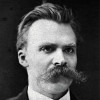“ it may be nobler to become the cause of his friend's acting than to act himself. In all the actions, therefore, that men are praised for, the good man is seen to assign to himself the greater share in what is noble. In this sense, then, as has been said, a man should be a lover of self; but in the sense in which most men are so, he ought not. ”
Aristotle, Nicomachean Ethics (c. 334 BC - 330 BC). copy citation
| Author | Aristotle |
|---|---|
| Source | Nicomachean Ethics |
| Topic | action sharing |
| Date | c. 334 BC - 330 BC |
| Language | English |
| Reference | |
| Note | Translated by W. D. Ross |
| Weblink | http://classics.mit.edu/Aristotle/nicomachaen.mb.txt |
Context
“all these things he will sacrifice to his friend; for this is noble and laudable for himself. Rightly then is he thought to be good, since he chooses nobility before all else. But he may even give up actions to his friend; it may be nobler to become the cause of his friend's acting than to act himself. In all the actions, therefore, that men are praised for, the good man is seen to assign to himself the greater share in what is noble. In this sense, then, as has been said, a man should be a lover of self; but in the sense in which most men are so, he ought not.
9
It is also disputed whether the happy man will need friends or not. It is said that those who are supremely happy and self-sufficient have no need of friends; for they have the things that are good, and therefore being self-sufficient they need nothing further, while a friend, being another self, furnishes what a man cannot provide by his own effort;”
source



